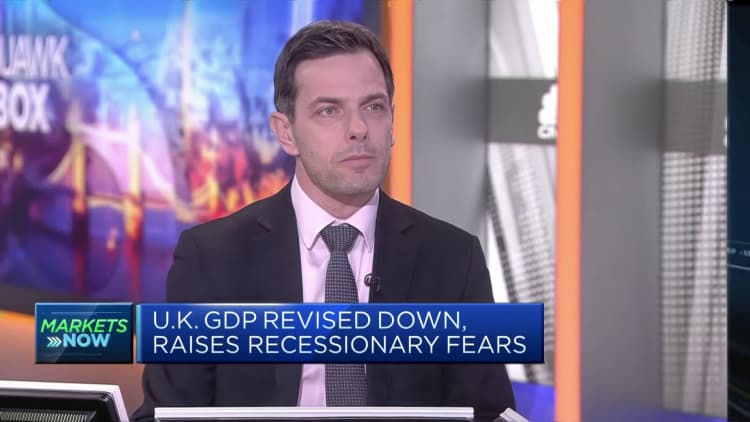
U.K. mortgage rates are falling as markets anticipate the Bank of England will start cutting interest rates toward the middle of the year — but uncertainty is likely to continue to dent buyer confidence.
HSBC announced cuts beginning Thursday on its residential mortgage interest rates, with several falling below 5% for the first time since April 2023. The largest drop was to its 10-year fixed rate remortgage deals, one of which is down from 4.99% to 3.99%.
Reductions have also been announced by Britain’s largest mortgage lender, Halifax, including to its two-year fixed-rate remortgage which dropped from 5.64% to 4.81% this week.
It marks a sharp reduction from last summer when the average rate of a two-year fixed deal hit a 15-year-high of 6.66%.
Martin Stewart, director of mortgage advisory London Money, said there was a degree of positivity in the market going into 2024 that was absent this time last year, driven by an uptick in lender confidence.
A year ago, “no one wanted to be the cheapest on the market. That has now turned 180 degrees, competition has returned and now the banks are competing with each other once again,” he said by email.
The average two-year fixed rate residential mortgage rate in the U.K. was 5.87% as of Jan. 4, according to research published daily by Moneyfacts, down from 6.29% two months ago. The average five-year fixed rate was down to 5.53% from 5.87%.
There are also more residential and buy-to-let mortage products available, Moneyfacts found.

The mortgage rate cuts come amid broader signs of resilience in the U.K. housing market.
House prices fell by 1.8% in the year to December, according to lender Nationwide, defying calls of a plunge of up to 10% through the course of 2023.
Meanwhile, figures published Thursday by the Bank of England showed morgage approvals in November picked up to the highest level since June. The total of 50,067 for the month came in above the 48,500 forecast in a Reuters poll.
Ashley Webb, U.K. economist at Capital Economics, said the Bank of England data — which also showed that consumer borrowing hit its highest level since March 2017 — suggested that the recent falls in mortgage rates would stimulate new borrowing, but noted that “many existing borrowers will soon experience higher rates.”
“With the full effects of higher interest rates on existing mortgage holders yet to be felt, we still suspect the household sector as a whole will rein in its spending further,” Webb said in a note.
Capital Economics on Thursday moved forward its forecast for the first Bank of England rate cut to June 2024, from November 2024. It sees a reduction in the key rate from 5.25% now to 3% in 2025, slightly lower than the 3.25% currently priced in by markets.
The central bank stressed in December that monetary policy would remain restrictive for an “extended period,” but the fall in headline U.K. inflation to 3.9% in November, its lowest level since September 2021, fueled bets on cuts as soon as May.
The year ahead for the housing market remains uncertain, cautioned London Money’s Martin Stewart, with factors including a sluggish economy, an upcoming national election and wider geopolitical volatility to consider.
“Transactions are likely to weaken further in the short term and the market still lacks the two main ingredients required for a healthy property sector – demand and urgency. But, all the time the banks remain confident, there is a hope and expectation that consumer confidence will eventually rise once again,” he said.
Credit: Source link












